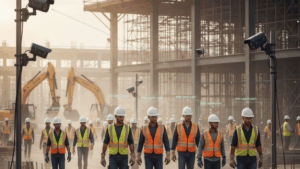The resolution of complex disputes, whether in the public or private sphere, often depends on technical elements that go beyond legal knowledge. It is in this context that judicial and arbitration expertise , essential tools for providing reliable support for the decision-making of judges and arbitrators.
The expert acts as the person responsible for the technical analysis and the legal or arbitration decision, presenting objective and impartial analyses that help clarify points of conflict in contractual disputes, infrastructure works, engineering, economics, accounting or asset valuations.
What is a Forensic Expertise?
A forensic examination is a technical procedure used in cases before the Judiciary. It is ordered by a judge when there is a need to verify or clarify facts that require specialized knowledge for a sound decision. In a judicial proceeding:
- The judge appoints an expert specialized in the technical area related to the controversy (engineering, accounting, economics, medicine, etc.);
- The parties may appoint technical assistants, who monitor the expert's work and may present additional technical opinions;
- The expert report, the final document produced by the expert, is incorporated into the proceedings and serves as technical evidence to support the judicial decision.
Practical example: Imagine a public infrastructure project in which the contractor accuses the construction company of delays and substandard workmanship. The judge may order an engineering expert to evaluate the execution, identify flaws, calculate losses, and clarify whether the schedule and contractual conditions were met.
What is an Arbitration Expertise?
Arbitration expertise occurs in an arbitration proceeding, primarily used in large or highly complex contracts, in which the parties prefer to resolve disputes outside the courts. In arbitration:
- The arbitral tribunal or sole arbitrator has powers similar to those of a judge, including to order expert opinions;
- The process is private and confidential, which attracts many companies seeking speed and confidentiality;
- The expert may be appointed directly by the parties or chosen by the arbitration tribunal, and his or her report follows the same principles of impartiality required in the Judiciary.
The main difference is that arbitration expertise usually takes place in a more dynamic and flexible environment, with greater technical interaction between the expert, technical assistants and arbitrators, allowing the discussion to be more objective and focused on results.
The Role of the Expert
The expert is the specialized professional designated to perform the investigation, always with impartiality and technical rigor. Their main responsibilities include:
- Analyze technical and contractual documents related to the case;
- Carry out inspections, measurements and surveys, when necessary;
- Respond to questions presented by the judge, arbitrator or parties in a clear, objective and reasoned manner;
- Produce the expert report.
It is essential that the expert has proven experience and in-depth technical knowledge, as their analysis will serve as the basis for decisions with high financial and legal impact.
What are Questions in Expertise?
The questions are formal questions that guide the expert's work during the investigation. They can be prepared by the judge, the arbitrator, or the parties involved in the dispute.
The purpose of the questions is to delimit the scope of the expert analysis and ensure that the report answers the main technical questions that influence the decision of the process.
Examples of questions in engineering expertise:
- Was the work carried out in accordance with technical standards and the contract?
- Are there construction defects that impact the safety or functionality of the project?
- What is the estimated cost for correcting the identified defects?
- Were the delays in execution due to the contractor's responsibility or external factors?
Answers to these questions provide technical clarity to the judge or arbitrator and help avoid decisions based solely on allegations.

Differences between Judicial Expertise and Arbitration Expertise
Although both have the same objective, to technically clarify the points of conflict, there are important differences between the two contexts:
| Aspect | Forensic Expertise | Arbitration Expertise |
| Environment | Public process | Private and confidential procedure |
| Appointment of the expert | Judge | Arbitrator or by the parties themselves |
| Deadlines | Suitable for the case | Suitable for the case |
| Technical training | Wide | Closer to the objective under analysis |
| Confidentiality of information | Public, with exceptions | Contractual confidentiality |
| Speed | Generally smaller | Generally larger |
The importance of expertise in contractual disputes
In cases involving engineering contracts
- Prevent unfair decisions by providing impartial technical evidence;
- Measure financial impacts, such as losses, delays and additional costs;
- Prove contractual compliance or non-compliance;
- Avoid lengthy litigation, as a well-prepared report often encourages agreements between the parties.
Furthermore, having technical assistants increases the parties' defense capacity, ensuring that all sensitive points of the contract are analyzed in depth.
Best practices for conducting an efficient expert assessment
In both judicial and arbitration settings, some practices increase the quality and reliability of the expert process:
- Clear definition of the questions before the start of the expert assessment;
- Provision of complete documents to the expert;
- Transparency and collaboration between parties, avoiding obstructions;
- Monitoring by technical assistants to strengthen the defense;
- Respect for deadlines and due diligence to ensure the validity of the report.
When these steps are followed, forensics becomes a strategic tool for resolving complex disputes, especially in high-investment sectors such as infrastructure, oil and gas, and energy.
The strategic value of expertise
Judicial and arbitration expert reports go far beyond simple technical analysis; they provide legal security for companies, investors, and government agencies. In major contractual disputes, a well-prepared expert report can be the difference between a favorable decision and millions in losses.
Understanding the role of the expert, the importance of the questions, and the differences between the judicial and arbitration environments is essential for any organization seeking to protect its rights and reduce risks in complex contracts.




